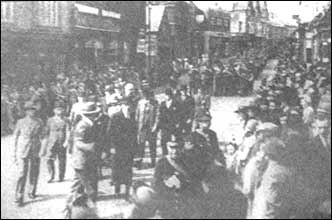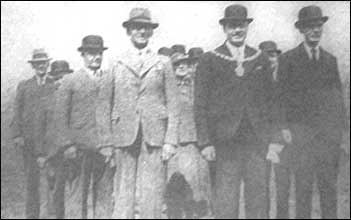|
||||||
| The Rushden Echo and Argus, 8th May, 1942, transcribed by Gill Hollis |
||||||
|
Civic Service 1942
|
||||||
|
Civic Sunday at Rushden
Council Chairman Attends High-street Church Public Procession
|
||||||
|
Rushden’s annual civic church parade, which is organised by the Hospital Week Committee, was seen at its best on Sunday afternoon, when Coun. W. J. Sawford, J.P., recently appointed chairman of the Urban Council, was accompanied to the Independent Wesleyan Church by his Council colleagues and many of the local societies and public services. Many people watched the march of the procession which was marshalled at Spencer Park by Mr. A. J. Sturgess. The Council led the way this year, followed by a massed band under Mr. M. J. Roberts, the Air Training Corps, Special Police, National Fire Service, British Legion, ambulance men and nursing sisters, friendly societies, Rotary Club, Toc H, Free Church Council, Hospital Week Committee, Trades Hospital Fund Committee, Scouts, Guides, Boys’ and Girls’ Brigades, Air Scouts and other organisations. Mr. Sawford was accompanied by Couns. A. F. Weale (vice-chairman), Mrs. O. A. H. Muxlow, A. Allebone, J.P., C.C., J. Allen, A. H. Bailey, W. E. Capon, T. W. Cox, R. W. Davies, J. George, F. Green, J.P., J. H. J. Paragreen, J. T. Richardson, J.P., J. Roe, E. A. Sugars, T. J. Swindall, and H. Waring, with the Clerk, Mr. W. L. Beetenson, Mr. F. J. Sharwood, C.C., and Mr. Cyril Faulkner, C.C., were also in the parade. The chief representatives of the Hospital Week Committee were Mr. G. W. Marriott (chairman) and Mr. L. W. Bradshaw (treasurer). Two welcome visitors were Miss Nelson, Matron of Northampton General Hospital, and Sister Beard, also from the hospital. Flag Ceremony The procession almost filled the church, and the remaining seats, including some extra chairs, were soon taken. An inspiring service was conducted by the Rev. T. S. Kee, minister of the church, who was accompanied in the pulpit by the Rev. Edwin Hirst, Vicar of St. Peter’s. On the rostrum were the Rev. E. A. Green, Rector of St. Mary’s, and the Rev. E. E. Bromage, pastor of the Mission Church, these receiving the flags and standards while the choir sang “Now thank we all our God.” All the hymns were closely in line with the prevailing thought; they were “The Lord’s my Shepherd,” “O Thou before whose presence,” “O loving Lord” and “Behold, the mountains of the Lord.” The Council Chairman read the lesson (St. Luke 10, verses 25-37) and the prayers – for civic and national leaders, the British Empire and the work of healing – were led by the Vicar of St. Peter’s. Conducted by Mr. W. T. L. Flood and with Miss M. Stapleton at the organ, the choir sang an anthem, “Sing O heavens.” In a concise and effective address the Rev. T. S. Kee said that in his native Scotland the occasion would be called the “kirking” or “churching” of the Council. It meant that as the councillors entered upon another year of freely and gladly given service they came first of all to the House of the Lord. That was as it should be; there was nothing strange in the act by which they brought their responsibilities to God. The Hour of Need Mr. Kee said he had chosen “Go and Do” as a motto for all of them. They were privileged, whether as councillors, nursing sisters or boy scouts, to serve the community in its neediest hour. So urgent was the need of our day that all must be ready to serve; none could be excused and none exempted. They often said that a grim age like ours brought out the worst in men or nations. That was true only if their intent be for evil; but if their intent be right and true – for the shaping of a happier age and a better world – then surely such an aim brought out the best in men and in communities. As a nation we earnestly followed a leader who had promised, very frankly, blood and sweat and tears, but under God, at the last freedom and peace. There were all kinds of “isms” in the world, and some of them they would gladly do without, but there was a happy “ism” which was called “Samaritanism.” They must build the new Jerusalem stone by stone, slowly and laboriously; it called for nothing less than consecrated manhood and womanhood. They needed to found in Rushden, as elsewhere, a league of Good Samaritans. They needed to spread the gospel of Samaritanism until it was impossible for any fellow-being or nation to be stripped and beaten and left half dead. When the day of reckoning came after the present carnage they must not forget their league of Good Samaritans, because there would still be an urgent need for the oil and wine, and the motto would still be “Go and Do.” After the address a collection amounting to £12 was taken in aid of Northampton General Hospital. The service closed with the National Anthem. |
||||||

